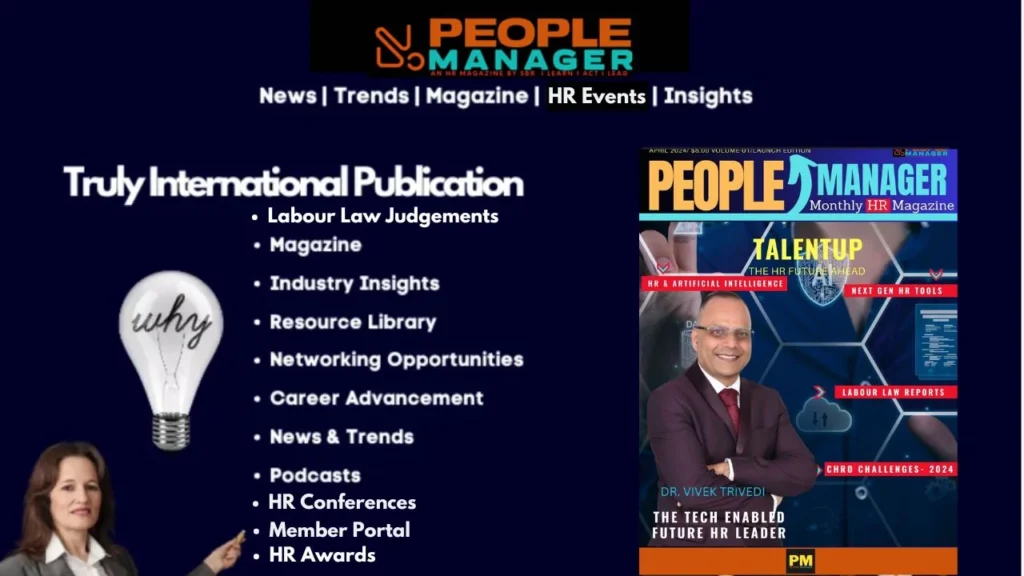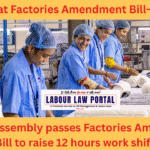>> IMPORTANT JUDGEMENTS
Workmen must be paid compensation on account of closure of the management due to genuine reasons.
- DELHI HIGH COURT
Labour Court/Industrial Tribunal is not empowered to review or recall its judgments.
- DELHI HIGH COURT
Tribunal can’t ignore financial capacity of employer while adjudicating dispute over wage revision.
- SUPREME COURT OF INDIA
Slapping of superior by the subordinate employee is a grave misconduct justifying termination.
- BOMBAY HIGH COURT
No industrial dispute can be raised against the employer after the employee has received VRS amount.
- KARNATAKA HIGH COURT
Entitlement to promotion is not necessarily an ‘industrial dispute’ under the ID Act.
- ORISSA HIGH COURT
Weekly offs cannot be deducted while calculating the number of days an employee has worked.
- RAJASTHAN HIGH COURT
Belated application does not defeat the employee’s right of claiming gratuity.
- CALCUTTA HIGH COURT
Assistant Labour Commissioner cannot decide complaint filed by the Inspector under Minimum Wages Act.
- MADHYA PRADESH HIGH COURT
Absence of CLRA license would indicate that workers were directly employed by principal employer.
- DELHI HIGH COURT
An appeal can lie against the ICC’s order where the complaint was disposed off as closed.
- DELHI HIGH COURT
Disciplinary authority needs to take into consideration the past conduct of the workman before passing order of penalty.
- KARNATAKA HIGH COURT
No notice is required to be given for transfer of workmen.
- GUJARAT HIGH COURT
It is mandatory for the enquiry officer to serve notice of enquiry to the workman.
- CALCUTTA HIGH COURT
Termination after serving retrenchment notice on grounds of grave misconducts but without conducting enquiry is illegal.
- DELHI HIGH COURT
Incentive bonus that was calculated every month but used to be paid after three months would be ‘wages’ under the ESI Act.
- PUNJAB & HARYANA HIGH COURT
If there is absenteeism from services, the workman may be terminated even without conducting any enquiry.
- DELHI HIGH COURT
The dependants of a deceased employee who was insured under the ESI act cannot approach the Compensation Commissioner.
- DELHI HIGH COURT
Tribunal can compare establishment with equally placed industrial units in a dispute of wage revision.
- SUPREME COURT OF INDIA
Dismissal of woman’s complaint by ICC was proper when allegations were made to hide her indiscipline.
- CALCUTTA HIGH COURT
Mere delay in decision of proceedings before CGIT cannot dilute evidence produced by management.
- BOMBAY HIGH COURT
Plea of non-payment of minimum wages cannot be taken in a complaint made only with respect to overtime.
- MADHYA PRADESH HIGH COURT
Employee cannot change date of birth after 10 years even though the original one was incorrect.
- SUPREME COURT OF INDIA
Section 33-C (2) of the ID Act does not provide for awarding interest for delayed payment.
- ALLAHABAD HIGH COURT
Employee cannot withdraw resignation after it is accepted by the appropriate authority.
- SUPREME COURT OF INDIA
Factory owner continues to be the occupier if he sublets his premises for construction to a third party.
- KARNATAKA HIGH COURT
Provisions of EPF&EPS Schemes covering international workers irrespective of salary drawn are unconstitutional.
- KARNATAKA HIGH COURT
Depositing interest in reasonable installments should be permitted in case of financial problems.
- MADRAS HIGH COURT
Order of EPF Authority without considering defence of establishment is unsustainable.
- MADHYA PRADESH HIGH COURT
EPF Authority has to hear plea of non applicability if the establishment is a cooperative society.
- GAUHATI HIGH COURT
EPFO cannot claim extra amount without assigning reasons after surrender of exemption.
- CALCUTTA HIGH COURT
Non-deposit of pre-deposit amount will lead to dismissal of appeal at the stage of admission.
- GUJARAT HIGH COURT
Orders passed by the Central Board u/s 14B of the EPF Act are appealable before the Tribunal.
- MADRAS HIGH COURT
Plea of non applicability of the EPF Act on account of infancy of establishment cannot be taken.
- PUNJAB AND HARYANA HIGH COURT
Pre-deposit is not mandatory for appeal against damages.
- MADRAS HIGH COURT
Limitation Act is not applicable for appeals before EPF Tribunal.
- ALLAHABAD HIGH COURT
Upper limit of rate of damages cannot be mechanically imposed by PF Authorities.
- MADRAS HIGH COURT
It is not necessary for Tribunal to grant complete waiver of deposit for non identification of employees.
- BOMBAY HIGH COURT
Assessment of PF dues was justified when employees’ names were verified with attend-ance registers.
- ANDHRA PRADESH HIGH COURT
Damages to be levied u/s 14B of the EPF Act cannot exceed arrears as specified in the Scheme.
- MADRAS HIGH COURT
EPFO must accept Govt. securities invested in terms of investment pattern upon surrender of exemption.
- CALCUTTA HIGH COURT
Interest on belated remittance of EPF dues is mandatory.
- MADRAS HIGH COURT
HC can grant stay till pendency of appeal on deposit of some of the pre-deposit amount by em-ployer.
- BOMBAY HIGH COURT
There cannot be an unlimited salary threshold for IWs while denying the same to Indian workers.
- KARNATAKA HIGH COURT
For the purpose of payment of bonus to the employees, the definition of “wages” as provided in the Minimum Wages Act, cannot be used.
- DELHI HIGH COURT
Maternity Benefit Act is applicable to private educational institutions in Kerala.
- KERALA HIGH COURT
Workman cannot claim regularisation in government department when there was a break in the service.
- DELHI HIGH COURT
Wards of insured persons are entitled to preferential quota for admission in some ESI medical colleges.
- DELHI HIGH COURT
Contractual employees also fall within the ambit of the definition of “workman” as defined under Section 2(s) of the ID Act.
- DELHI HIGH COURT
Merely dismissing a workman during pendency of industrial dispute does not make the order of removal or dismissal void thereby entitling the reinstatement of the employee.
- KERALA HIGH COURT
Even temporary/contractual employees can form a trade union.
- KARNATAKA HIGH COURT
Reinstatement is not a viable option when the workman was retrenched 16 years ago.
- DELHI HIGH COURT
A driver cannot challenge punishment imposed on him directly before the High Court.
- KARNATAKA HIGH COURT
Transfer made to a place where there was no vacant position and on the false pretext of promoting is mala fide.
- DELHI HIGH COURT
Technical considerations of res judicata does not apply to industrial disputes.
- DELHI HIGH COURT
Court has the discretion to not award back wages along with reinstatement depending on the past conduct of the workman.
- DELHI HIGH COURT
After a common dispute pertaining to multiple workmen has been properly espoused by a union, the Labour Courts can adjudicate the reference collectively for all workmen involved.
- DELHI HIGH COURT
Communication of resignation is not necessary unless mandated by the rules governing the same.
- SUPREME COURT OF INDIA
Expressions ”baby” and ”sweety” are per se not sexually coloured so as to constitute sexual harassment.
- CALCUTTA HIGH COURT
When the ICC report was not in dispute, the finding of the Labour Court that the report was not proved is incorrect.
- KERALA HIGH COURT
Particulars of admitted date of birth cannot be questioned before the High Court.
- GUJARAT HIGH COURT
Limitation under the POSH Act is not to be seriously applied in cases involving continuous molestation and harassment.
- MADRAS HIGH COURT
Working journalists are not workmen under the ID Act or employees under the MRTU and PULP Act.
- BOMBAY HIGH COURT
Tribunal cannot intervene with quantum of punishment under section 33(2)(b) of the ID Act.
- MADRAS HIGH COURT
Joining some other employer on the next day of termination would not disentitle the workman to seek relief.
- PUNJAB AND HARYANA HIGH COURT
An employee cannot be made to work for another employee unilaterally.
- PUNJAB AND HARYANA HIGH COURT
 B-20, West Patel Nagar, New Delhi-18 (India) | 011-39330001 |
B-20, West Patel Nagar, New Delhi-18 (India) | 011-39330001 |  +91-762-691-24-36 | Email: info@peoplemanager.co.in
+91-762-691-24-36 | Email: info@peoplemanager.co.in



